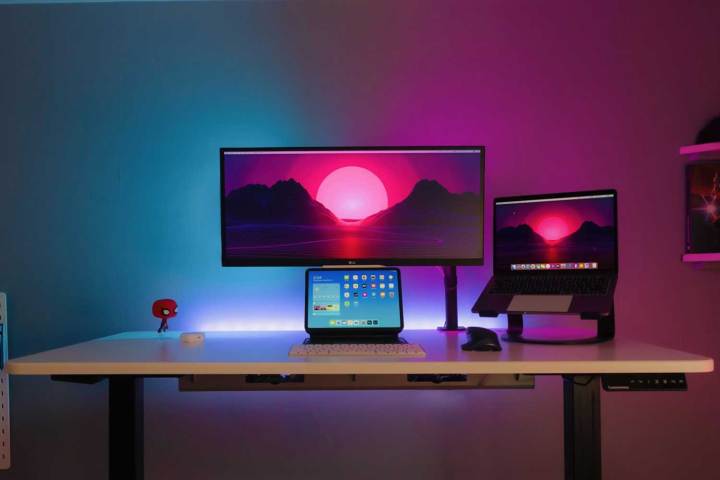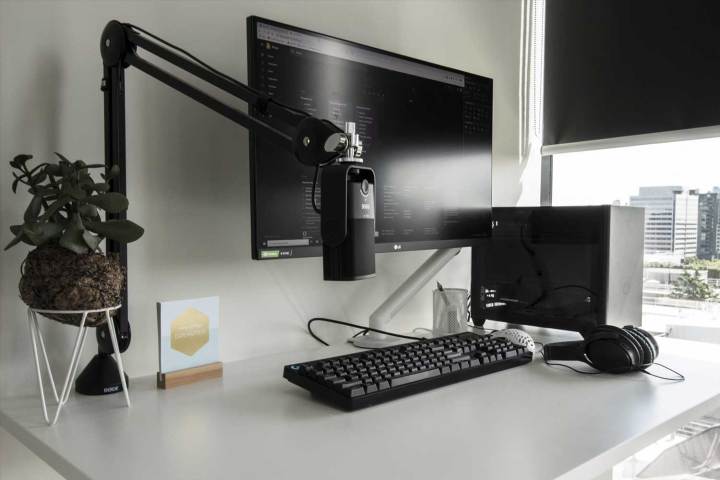
Should you put your PC on a desk or on the ground? It’s a debate as old as time. If you have the luxury of both options, then this is a choice you’ll inevitably need to make.
But let me lay my cards down first. I like my PC on the floor. You heard me right, and I’m not ashamed of it either.
Before you send me an email, though, let me say that my point isn’t to convince you I’m right. Instead, I will weigh the pros and cons and make a case for both scenarios to help you make the right choice for yourself.
The floor
Stick that ugly black box where it belongs. Maybe no need to be quite so mean, but let’s face it: your PC is a tool. That’s my perspective, at least.
It’s a box of electronics that helps you work and maybe play, but do you need to look at your Blu-ray player to watch a UHD movie? Do you need to have your smartphone’s RGB lighting shining into your eyes while you’re trying to get some work done?

If there’s one thing a PC doesn’t need, it’s to be shown off. It is a functional piece of equipment that does the job just the same if it’s tucked away in a desk or under one.
Well, that’s not strictly true. It stands a greater chance of overheating if it doesn’t have ready access to cool air, and if you’re putting it on a rug or carpet, it will almost certainly collect dust in its filters far quicker, exacerbating the overheating issue.
It’ll be quieter, though. At least until you forget to clean it, and the dust filters become clogged. But you get a lot more desk space with your PC tucked under there, out of sight. That also means fewer cables to tidy away or deal with spaghettifying your space.
You don’t need to be concerned with the safety of a floor-mounted PC, either. It’s much less likely to be bumped or knocked over. Really, unless someone is looking to practice their calf kicks in the office, you’re PC’s structural integrity is unlikely to be questioned.
That goes out the window with pets and young children, though. I fitted a toggle switch cover to my PC’s power button when mine were toddling about hitting and eating everything that I held dear. A floor PC also means you’ll need to bend down and even get under your desk to change accessories and peripherals, which is fine if your back is fine, but not all of us are that lucky.
When it comes down to it, though, I keep my PC on the floor for two primary reasons: noise and desk space. Desktop PCs are both loud and large and keeping them on the floor is my solution to both of those problems. That’s just not something I’m willing to compromise on.
The desk

Whoa, whoa there. That was a lot of hate for the humble, respectable, awe inspiring world that a desktop PC opens up for an intrepid professional or gamer. It’s a wondrous thing that you’ve poured hours into choosing the right components, the perfect processor, and the most cutting-edge graphics card. It’s your baby, and like any flesh and blood offspring, this collection of curated components deserves to sit in pride of place in your home or office. Or home office. Or The Home Office.
There’s an argument to be made that understated PC designs with blacked-out interiors, subdued lighting, or a stealth aesthetic might be better suited to being mounted on the floor, but if you want people to see it — if you want to see more of your pride and joy — putting it on your desk is the only way to go. And who cares about the lost space? What were you doing with it anyway?
You might even get a performance advantage out of that vanity, too. A PC mounted on a desk almost certainly has fewer impediments to its airflow than a PC placed on the floor, and its fans are less likely to pull in dust and debris from the floor itself, meaning you should need to clean the dust filters less frequently.
Fan noise and any coil whine will be more pronounced, though. Not only are the PC and its noise-making components closer to your ear(s), but you don’t have the physical buffer of your desk to dampen any noises further. Depending on the design, material, and thickness of your desk, that can make quite a sizable difference.
Still, that’s nothing a fan controller and headphones can’t fix.

Having your PC up on your desk also means you get it away from sticky children’s fingers and pet hair, which is definitely a recipe for better PC longevity. The only downside is that you then have to trust the older children and adults in your life not to knock it over and spill a drink on it. That probably won’t happen, but I can’t stress enough how much you do not want this to happen. So, make sure it can’t.
Floor vs. desk
Despite my best efforts to split my personality in two and make an even case for both, I’m going to leave my PC on the floor. I’ve had many PCs on my desk over the years, but today I value the negative space and lower noise levels more than my LED lightshows of yester-PCs.
I would do it again, though. If I get the bug to build something beautiful in the future, I might even wall-mount it to get the best of both worlds. Either is fine, though and as long as you know the particulars of floor and desk mounting, you can have an equally great experience. Each just has its own eccentricities to consider.



